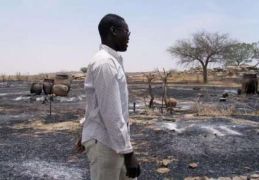Sudan’s effort to evade ICC must be resisted – activists
Feb 25, 2007 (NAIROBI) — Khartoum’s effort to evade justice over its atrocities in Darfur must be resisted, say the International Crisis Group’s Nick Grono and David Mozersky.
 The Sudanese regime is, by any measure, one of the most brutal and destabilising in the world today, say the experts, and the government’s atrocities have not been limited to Darfur.
The Sudanese regime is, by any measure, one of the most brutal and destabilising in the world today, say the experts, and the government’s atrocities have not been limited to Darfur.
Khartoum has harshly suppressed nascent rebel groups in the east of the country, killing hundreds of civilians in the process.
The 20-year conflict it fought with rebels in the south and centre claimed some two million victims. And it is actively fuelling rebellions in neighbouring Chad and the Central African Republic.
Nick Grono is vice-president of the International Crisis Group while David Mozersky is the Horn of Africa project director, which gives their views considerable weight.
All of this makes Khartoum an eminently worthy target of the International Criminal Court (ICC), which is mandated to investigate and prosecute such atrocities.
The United Nations Security Council obviously thought so when, in March 2005, it referred the case of Darfur to the ICC — with tacit US support. Yet those opposed to the ICC, both inside and outside Sudan, are now fighting a rearguard action.
They are arguing, disingenuously, that the ICC is one of the main obstacles to peace in Darfur.
Their reasoning goes something like this: Khartoum has previously accepted a UN peacekeeping force in its south as part of the deal to end the civil war there, so clearly it has no fundamental opposition to UN peacekeepers on its territory; it is only because Sudan’s leaders fear that a peacekeeping force in Darfur will arrest them and bring them before the ICC that they are opposed to the deployment of such a force. Hence the ICC is an unwitting party to the government’s atrocities.
It is a deeply flawed argument that serves only to give comfort to the regime’s apologists. It is founded on three false premises.
First, Khartoum has long been opposed to an effective peacekeeping force in Darfur, and that opposition predates the ICC referral by at least 18 months.
The Sudan government is determined to wipe out the rebel groups in Darfur, at almost any cost, as it does not wish to share power or wealth with them and by so doing weaken its grip on the state. To suggest that fear of the ICC is foremost in driving its opposition to UN peacekeepers is fundamentally wrong.
Second, even if UN peacekeepers are deployed — unfortunately still a big if — Khartoum knows that they will be restricted to Darfur, and with a very limited mandate.
That mandate will not authorise them to arrest government officials or hand them over to the ICC. The UN peacekeepers already in Sudan’s south have a similarly limited mandate and area of operations, which is why Khartoum agreed to their deployment.
Third, if the Sudanese regime is genuinely frightened of the ICC, it has a strange way of showing it. Since the ICC started its investigation, Khartoum has not only continued its campaign of atrocities, but escalated it — despite warnings from the then UN secretary-general Kofi Annan that those responsible would be held accountable.
The ICC may find it easier to make its case if peacekeepers are in place to provide security throughout Darfur.
Khartoum is also worried that the prosecutor, Luis Moreno-Ocampo, may end up charging senior government officials and seek to put them on trial.
While it’s highly unlikely that the Security Council would then agree to change the peacekeepers’ mandate to empower arrest against Khartoum’s wishes, even the slim possibility is enough to cause the regime to undermine the ICC.
It is doing this by painting the ICC as an obstacle to peace, so as to make it a bargaining chip in eventual peace talks. Sudan’s leaders, fortified by the fact that the international community has failed to establish any other effective leverage over Khartoum, see the ICC as only currency on the table to “trade” for peace.
This hardline stance will remain until the international community brings real pressure to bear on Khartoum to alter its policies in Darfur, for instance by implementing targeted economic sanctions against government officials.
(The EastAfrican)
